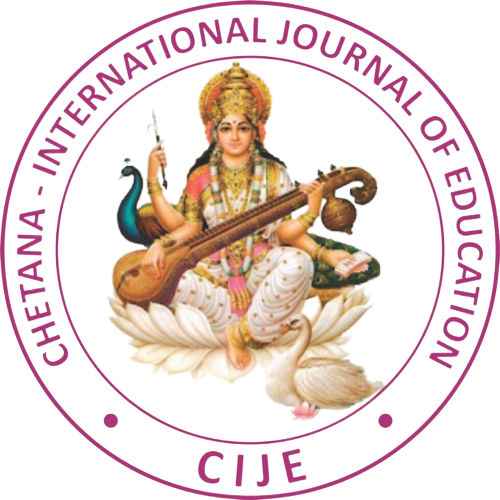 CHETANA CHETANA
International Journal of Education Chief Editor Prof. A. P. Sharma Chakoli Educational & Social Development Society Dholpur (Rajasthan) |
| EDITORIAL BOARD :Prof. O.S. Dewal
Prof. Arvind Pandey Prof. A.P. Sharma Dr. Anil Paliwal Dr. Vijay Grover Advisory Board: Dr. Alpana Sharma Mrs. Nicole Sharma (USA) Dr.Avnaish Parashar (Canada) Dr. SadhanaTyagi Dr. D.P. Singh Dr. Jai Dayal Singh Dr. B.N. Soni —————————————————————————————————————- Date of Publication : January – April 2017 Edition : 2/1 Cover Design : Ajay Singh Bhati Type setting & Printing : Contact: 08955890123 Publisher : Chakoli Educational & Social Development Society, Dholpur (Raj), India Email:chakolisociety@yahoo.in, ap_sharma 2010@yahoo.in website – www.echetana.com |
| Chetana Education International/January-March, 2017; Vol. 2, No.1 | ||||
| Sl. No. | Author | Article/Research Paper (Click here) | ||
| 1 | Dr. Anil Paliwal | How to Save Teacher Education in India? An Agenda for Radical Changes | ||
| 2 | Ms. Nicole Sharma | How Technology is Changing Aging and Dementia | ||
| 3 | Dr Pragati Bhatnagar | ICT-An Important Tool for Education | ||
| 4 | Dr. Manish Bhatnagar | Education and E-learning | ||
| 5 | Dr D P Singh | KAMALVANI 90.4 FM, COMMUNITY RADIO STATION KOLSIYA –Unique Trial in the Field of Education & Socio-Cultural Awareness | ||
| 6 | Dr. J D Singh | Promoting Quality Teacher Education: Need of the 21st Century | ||
| 7 | Dr. Sadhna Tyagi | The Impact of Project based Learning on Students’ Performance | ||
| 8 | Ms. Rajani Upadhyay | Improving Student Outcomes Through Inclusive Education | ||
| 9 | Dr. Peeyush Kumar Garg | Libraries and Social Networking | ||
| 10 | Ms. Mani Sharma | Research and Innovation in Teacher Education: Pragmatic Approach in today’s Scenario | ||
| 11 | Mr. Rajesh Kumar | Value-based Skill Development in Teacher Education | ||
| RESEARCH ARTICLES | ||||
| 12 | Dr. Vijay Kumar Grover | What Does ‘Success in Academics’ Mean to College Students? A Semantic Differential Analysis for Determining Constructs of the Concept | ||
| 13 | Dr. Yatendra Pal | A Study of Students’ Views Towards Research Process | ||
| 14 | Dr. Binita Prakash | A Comparative Study of Mental Health Status of Teachers Serving in Hindi and English Medium Secondary Schools | ||
| 15 | Dr. Chitra Jitendra Singh | Attitude of Teacher Trainees Towards Co-Curricular Activities | ||
| 16 | Mrs. Monika Guleria | A Study of Anxiety among Adolescents in Relation to their Personality, Mental Health and Family Environment | ||
| 17 | Dr. Narendrakumar Shreeram Pal | A Comparative Study of Parents’ Attitude towards the Schools | ||
| 18 | डा. जितेन्द्र लोढ़ा | प्रदूषित शैक्षिक-संस्कृति : एक अवरोध | ||
| 19 | डा. वीणा बाना एवं श्रीमती कुसुम | केन्द्रीय माध्यमिक शिक्षा बोर्ड के छात्रों की सतत् और व्यापक मूल्यांकन के प्रति अभिवृति का अध्ययन | ||
| 20 | डा. शिप्रा गुप्ता | आरटीई के तहत कमजोर वर्ग के बच्चों के प्रवेश प्रक्रिया की स्थिति व उनके समायोजन में आने वाली समस्याओं का अध्ययन | ||
| 21 | Kamal Kumar Mishra | A Study on the Significance of Number Theory | ||
IMPORTANT INFORMATION TO THE CONTRIBUTORS
|
||||


